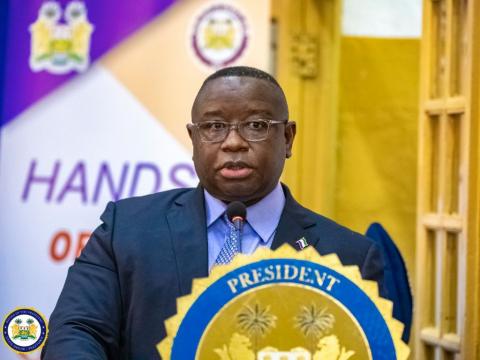By Francis H. Murray
President Julius Maada Bio has reiterated his government’s commitment in the fight against sexual and gender based violence (SGBV) by pledging to support the setting up of sexual offenses court at regional and districts levels across the country.
He made this statement at the opening of a special model court for sexual offences at the main Law Court Building on Siaka Stevens Street in Freetown on Friday.
‘‘We’re here today to launch another important step in this country’s fight against sexual and gender based violence against women and children. For the first time, we’re establishing a sexual offenses model court in this country. My government welcomes and formally embraces the establishment of the sexual offenses model court as part of its coordinated response to SGBV,’’ the president stated.
He went on to note that the establishment of the special court will ensure speedy trial of sexual offense cases and ensure that ‘‘vulnerable and intimidated witnesses’’ as well as victims, get the attention they deserve, adding that it will also reduce the surge of sexual offenses against women and children.
‘‘It is hoped that these courts will ensure speedy conclusion of sexual offense cases and increase the rate of conviction against perpetuators. It is also hoped that there’ll be enhanced cooperation between the courts and the other agencies like the ‘One Stop Center’, the oversight committee and the law office,’’ he added.
While committing his ‘‘unwavering’’ support to the judiciary for the establishment of similar courts at district level, Bio also used the occasion to admonish judges to administer justice fairly in a way that respects the fundamental rights of both the victims of SGBV and the accused persons.
‘‘Without compromising their impartiality, we expect judges to take all necessary and proactive measures in ensuring that survivors get justice. We also expect judges to engage regularly with civil society organizations, the media, government and citizens, till each of these sectors know what role to play in developing more effective strategies in fighting SGBV,’’ the oresident stressed.
In explaining the reason for the special court, Chief Justice of the Republic of Sierra Leone, Desmond Babatunde Edwards, disclosed that the move came as a result of the numerous difficulties victims and witnesses faced in testifying about the ‘‘intricate’’ details of sexual offenses and their vulnerability either by age or fear of stigmatization.
‘‘The objectives of the court are to provide effective victim-witness support services that will reduce trauma, eliminate secondary victimization, increase victim’s cooperation and attendance at the trial and ensure the timely conclusion of matters,’’ he explained.
He assured all of the judiciary’s readiness to curb the menace of SGBV against women and children and to bring culprits to book.
‘‘We’re ready to increase our relevance in addressing sexual exploitation and at the same time punish the impunity in sexual exploitation with the robustness with which it deserves in order to deter others from committing such crimes,’’ he noted.
The new court provides for witnesses to testify behind a curtain alongside support persons from an enclosed witness box which will prevent eye contact with the accused, a waiting room facility where support persons engage and prepare victims and witnesses prior to their testimony and an information center for SGBV cases, among others.
Representing the Rainbow Initiative, a non-governmental organization that gives medical and psychosocial support to victims of sexual offenses, Dr. Olabisi Claudius Cole expressed excitement at the new development, referring to it as a ‘‘momentous and historic event.’’
She went on to note that amid existing challenges and successes, the Rainbow Initiative had ‘‘successfully’’ provided psychosocial services to over 5, 000 women, girls and boys since its establishment in 2002, adding that the organization now has five centers in Freetown, Bo, Kono, Kenema, and Makeni.
She added that there had been a surge in the cases of SGBV in recent times with a total of 3, 701 sexual assault cases reported in 2019 and 196 physical assaults, bringing it to the total of 3,897. She added that from the start of 2020 to May, they had recorded 1, 270 cases.
First Lady Fatima Jabbie Bio described the issue of violence against women and girls as a ‘‘persistence problem’’ which she said limited the capability of women and girls to contribute to society and to national development. She said the problem has become common place in the country with no regards for the pride or dignity or women.
‘‘Violence against women and girls goes beyond sexual abuse. It includes the physical, emotional and economic consequences which serve as violations to the social and economic and political empowerment of women and girls in this nation,’’ she noted.
She called on all stakeholders to join the fight and to ensure that victims of rape enjoy unlimited access to justice and care support in communities.
‘‘As we gather here this morning, let us remind ourselves of our constitutional and moral responsibility of safeguarding the rights and future of our women and girls. We call on all development partners; the media, civil society organizations and rights based organizations to join hands in fighting a good fight towards eliminating the entrenched social and cultural practices that violate the rights and privileges of women and girls in Sierra Leone,’’ she said.
Copyright © 2020 Politico Online








